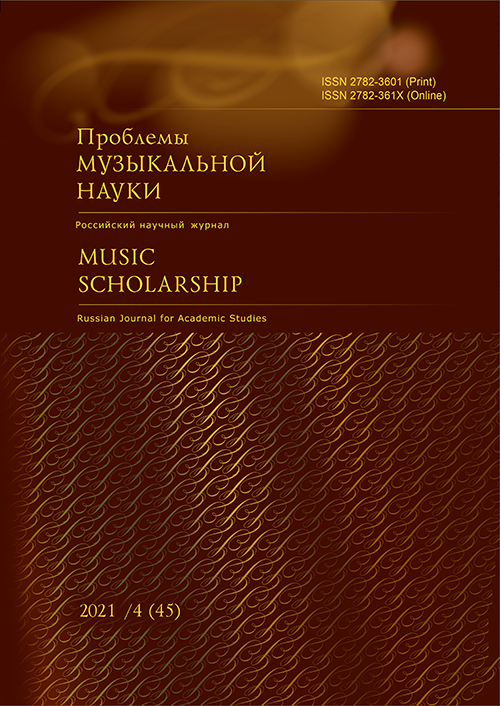"German Song" from Tchaikovsky's "Children's Album" in the Austro-German Context
Main Article Content
Abstract
The article analyzes some aspects of Tchaikovsky’s dialogue with the Austrian and German musical tradition, touching upon the problem of those cultural stereotypes which exert their influence upon someone’s identification of ‘another’s’ and his/her self-identification as ‘his/ her own’. To determine their role in the intercultural communication, it singles out several levels of the biographical, creative, musical-theoretical and socio-cultural interaction between Peter I. Tchaikovsky and the Austrian and German tradition. Along with the analysis of The German Song’s Leipzig edition and with the digest of Tchaikovsky’s biographical and creative intersection with the Austrian and German culture, the task of the article is to fix a lack of coincidence of the cultural codes. The result of this lack is a number of consequences important for the European reception of Tchaikovsky’s music as well as for the composer’s contacts with his contemporary European musicians. The genre and intonational complex of The German Song, given together with the author’s appraisal of Bach, Händel, Glück, Haydn, Mozart, Beethoven, and Schubert, show that Tchaikovsky perceived Austrian and German music within the framework of one and the same cultural and geographical community. The “correction” of this cultural stereotype became an eventual reason because of which the German composer
F.J. Bräuer renamed The German Song into The Tyrolian Dance in accordion arrangement for the version edited in Leipzig in 1944.
The other side of the dialogue was the Austrian and German musicians’ attitude towards Tchaikovsky’s creative work, which had undergone a certain evolution from an arrogant negation (Edward Hanslik’s review of The Violin Concert) to an enthusiastic acceptance (Tchaikovsky’s concert projects of the 1890-es when he was invited by the Vienna City musicians). Tchaikovsky’s failure to take part in Vienna International 1892 Exhibition became the consequence of the lack of coincidence between the socio-cultural etiquette “stereotypes” because of which the composer was bereft of a life-time creative triumph in Vienna.
In conclusion the article considers the matter of subsequent influence of music by Tchaikovsky on Austrian or Austrian-German composers at the turn of the 19-20th centuries, as well as the role of cultural stereotypes in this process.
Keywords: Tchaikovsky, “The German Song”, the Austrian and German culture, cross-cultural interactions, Yodel, “Mozartianism”, Vienna, Eduard Hanslik, Eduard Strauss.
Article Details

This work is licensed under a Creative Commons Attribution-NonCommercial-NoDerivatives 4.0 International License.
Copyright
The rights on the results of intellectual activity and equated means of individualization are protected in accordance with Part IV of the Civil Code of the Russian Federation. The authorship, author's name, executor’s name, inviolability of the work and result of execution are protected by the rules of Part IV of the Civil Code of the Russian Federation of the author or executor, regardless of providing legal protection of such results of intellectual activity at the time of their forming.
Copyright laws regulate the civil legal relations for using works of science, literature and art. Such relationships are formed as the result of the author’s writing his or her texts. In this case the author can rightfully claim copyright of the work.
The author has certain rights to reuse the work (see: “Ethical Aspects in Terms of Multifold Publications).
Licenses
All copyrights on the articles belong to their authors. The author transfers the rights on using the article the publisher.
PDF versions of scholarly articles of the journal PMN are published by using the license Attribution Non-Commercial No Derivatives cc by-nc-nd, allowing loading and distributing works on the assumption of indicating the authorship. The works may not be changed in any way or used for commercial interests.
Criteria for Authorship, Co-authorship
The term “author” refers to all persons (co-authors) who have made a substantial contribution to conducting the research and creation of the manuscript and responsible for its content. The person (author) who has submitted the manuscript to the editorial board shall bear responsibility for the complete list of the group of authors and the changes made to the manuscript in accordance with the results of the peer reviewing and editing.
1. Authorship is based on the following criteria:
1) The author made a substantial contribution to the research activity and development of concept, collected the data, made analysis and interpretation of the data.
2) The author carried out the writing of the text of draft articles and edited it attentively and substantially.
3) The author approved the final version of the article prior to its submission.
4) The author bears responsibility for the integrity of all parts of the manuscript.
2. The authors shall guarantee that the submitted manuscript is the original work.
3. Scholarly reviews for some issue or other should be objective, present material in a wide range and at the same time take into account the views of the author of the review.
4. The authorship of scholarly publications is obligated to reflect accurately the contribution of individuals to the research activity, with specific information about the authors.
5. The authors may not mislead the readers by publishing acknowledgements of gratitude to people who were not actually involved in writing the work. Other persons who made contribution to the work, but are nevertheless not the authors, may be listed in the rubric of “Acknowledgements,” with indications of the type and extent of their activities.
6. Authors are obligated to provide a description of their contribution to the publication.
7. The order of authorship must be a joint resolution of co-authors. The authors should be ready to explain the order of their enumeration and listing.
8. The authors shall be entirely responsible for the correct definition of authorship acting in accordance with the rules adopted in their institution.
9. Investigators must ensure that only those persons who meet the criteria for authorship (that made a significant contribution to the work), shall be considered the authors, and the researchers who do not merit authorship will be excluded from the list of authors.

